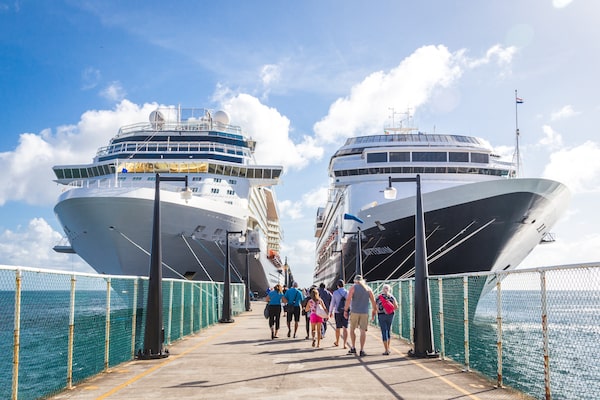
Cruise passengers return to ships at the Port Zante terminal in St. Kitts.Mariakray/iStockPhoto / Getty Images
Almost 30 million vacationers chose fun on the high seas in 2019, but does the outbreak of coronavirus now make cruise ships a travel pariah? With COVID-19 cases in 80 countries and counting, the floating village of a large ship seems like a prime place for the virus to flourish.
The Diamond Princess, which was the first ship quarantined due to coronavirus, had 705 people contract the disease (six of whom died) out of 3,711 passengers and crew.
The first line of defence for passenger health and safety – and a standard on large cruise ships – is an on-board medical team. Ships from major cruise lines have a minimum of one doctor and two nurses who are on call 24 hours a day and have experience in emergency, family and internal medicine and are often board-certified in multiple countries.
Coronavirus guide: The latest news on COVID-19 and the toll it’s taking around the world
What can I do about COVID-19? A guide for Canadians of what’s helpful, and what’s not
Ships have also embraced every doctor’s mantra for reducing the spread of disease: clean hands. Their answer is the prevalence of hand sanitizer, placing dispensers in multiple public areas from dining rooms to casinos; entry into these spaces comes with a cool dollop of anti-bacterial gel.
But an even better practice when in close quarters with hundreds of crew and passengers is the real thing: Wash your hands! Use soap and water for 30 seconds frequently throughout the day, and always after using the washroom and before meals. On many ships, hand-wash stations are available just outside dining rooms.
According to the U.S. Centers for Disease Control and Prevention, more than half of those who typically become ill on a cruise ship are over the age of 65 and are often already diagnosed with respiratory illness, seasickness, injuries from falling or gastrointestinal illness. Diseases like COVID-19 are rare.
Additional tips for keeping illness away – wash your hands every time you return to your stateroom, cover your face with a tissue when you cough or sneeze and dispose of it, drink water to avoid dehydration, use sunscreen, get your beauty sleep and take it easy on the multiple, often-rich courses offered at mealtime.
Last tip: If you feel unwell, isolate yourself in your room and contact the medical team. It may just be the sniffles or seasickness, but they are there to inform and diagnose if needed.
Need some travel advice or have a question about life on the road? Send your questions to personalconcierge@globeandmail.com.
Get inspired by the weekly Sightseer newsletter, with travel advice, destinations and more. Sign up today.